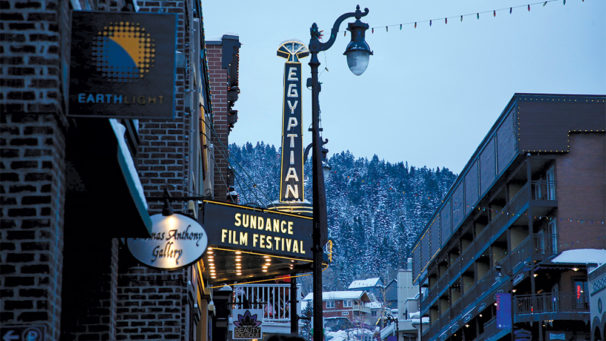
Educating the masses on the importance of reproductive rights has always been a challenge. How can organizations fighting for reproductive rights reach past their regular followers and actively educate new people? The answer is by essentially meeting people where they spend most of their time — in front of the TV, theater, phone, and computer screens. Planned Parenthood partnered with the 2019 Sundance Film Festival in a series of events used to introduce themselves as creative partners to the film and television industry. These events brought filmmakers, writer, artists, and other creators together to discuss, celebrate, and educate about accurate representation of reproductive health in media.
Meeting people where they are
According to Alencia Johnson, director of public engagement for Planned Parenthood, “Over 50 percent of people actually believe that the healthcare information they see on TV and film is accurate. Therefore, we need to make sure that abortion storylines and storylines around sexuality, love, relationships, birth control — whatever it may be — related to gender, and reproductive rights is accurate.”
She went on to say that media, especially television and film, are a way into homes they wouldn’t normally have access to. By entering those homes, Planned Parenthood can begin to normalize reproductive health. Doing so will humanize the topic for people who currently view the topic as an abstract thing that affects someone other than themselves.
Planned Parenthood: a resource for film and TV
Johnson says that the organization has been at this for a few years. They have been coming to Park City, Utah during Sundance and have built a large following there. “We get like 400 people come to the Sex, Politics, Film, and TV brunch. The curated [events] for women of color filmmakers are a little bit smaller,” because there are fewer women of color who are filmmakers. Johnson says that the events are designed to put the creators in contact with Planned Parenthood and their resources.
During the events, people on Johnson’s team work to show the creators how they can use their media project as a platform for reproductive health. Johnson also works to show creators the impact that accurate reproductive health information can have on the audience and the project. “That’s why we’re here. It’s so important that folks in the creative community are using their role and their position as a form of activism. So many people are trying to figure out what they can do.”
That’s the goal of the events like the “Sex, Politics, TV, and Film: The Celebration of Unstoppable Voices.” In addition to sharing resources, the events work to introduce the creators to the Planned Parenthood support network of 12 million people. Such a network is strong enough to back up creators who find themselves under fire from conservative right trolls.
Change the entertainment, change the culture
Johnson says that the ultimate goal is “shifting the culture.” And we do see that there will be a shift in culture if we normalize people’s experiences. Not just normalize it, humanize it.” And it’s working. In January 2017, National Public Radio published an article, “Abortion Plots on Television ‘Becoming More Diverse and Accurate.” Johnson says this, “is great, because there’s research that shows that roughly over 80 percent of abortion storylines are [about] white middle class women. And that’s the reality, right? It’s not the reality.”
She explained, “thankfully, for shows like Claws and Dear White People who have taken on these issues boldly and [made them] normal. [Abortion] it is a normal experience that women go through. Also, beyond just abortion. From birth control to breast cancer to consent, [there] has to be a conversation around consent in TV and film. That’s where people are getting their information, especially young people.”
Access to the entire Planned Parenthood Resource Bank
Johnson told me that Planned Parenthood does offer creators their best material. “We’ll do events around, broadly, what we are about: women exams, contraception, sex, education, all of that. [Planned Parenthood also gives] people real policy applications that we really need for them to stand on.” Some of their methods are “just providing basic information about all of our services, advising on scripts. Sometimes people will send scripts over for us to review. Sometimes we sit folks down with a physician or sex educator from our health center. Sometimes we allow folks to film in our health center or talk to a patient to get their experience. There’s numerous ways in which we provide information.”

No matter how it’s done. Johnson says the goal is to humanize reproductive health by ensuring accurate depiction in television and film. This way everyone knows how to access the resources. “We serve everyone and, you know, you find that not even just around reproductive health care, women’s health care, health care, broadly, there’s so many programs protected or hopefully protected by [public] policies.” She says that people are against these policies because, “Folks hear talking points and they quote, unquote, don’t believe in it. But they don’t realize that they are actually benefiting from [those public policies]. So then again, it is the conversation of humanizing [reproductive health] on TV [and film].”
The “Sex, Politics, TV, and Film” Brunch was a sea of creatives, just as Johnson described. The networking and discussions ranged from favorite current show on television to upcoming shows that center on women. The running theme throughout, however was, “how can we use our show, film, project to advance reproductive health?” Attendees were pouring over the brochures and marveling at just how many of fan favorite shows are already aboard the Planned Parenthood partnerships. Jane the Virgin, GLOW, Jessica Jones, Scandal are just a few.
The brunch was just one of a handful of events that Planned Parenthood hosted at Sundance this year. You can find more information on and resources that you can contact the Planned Parenthood Federation of America for more information.












Comments